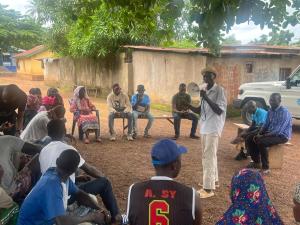Quiet commitment in Kambia: Maligie Fofanah supports community response to mpox in rural Sierra Leone
Dare Es Salam, Gbinleh Chiefdom, Kambia District – July 2025
In the rural village of Dare Es Salam in Gbinleh Chiefdom, Kambia District, 54-year-old Maligie Fofanah walks from house to house, quietly supporting his community’s health. As a Community Health Worker (CHW) Peer Supervisor, Maligie is part of the broader national and district response efforts to Mpox, working alongside teams deployed with support from the World Health Organization (WHO) and partners.
“Our role is to help identify people who may be sick, refer them to the health centre, and educate others about how to protect themselves,” he explains calmly. “I want to help save lives.”
Maligie has been a part of community health work since 2010. First trained as a Community Health Volunteer, he later transitioned to a CHW through additional training. Over the years, he has been involved in delivering treatment for childhood illnesses, supporting family planning and adolescent health, and raising awareness about disease prevention.
Now, with the national response focused on Mpox, Maligie is supporting active case search efforts in his section, alongside other CHWs and district health teams. He explains the signs of Mpox clearly such as headache, fever, rashes and body pain, and emphasizes early referral to health facilities.
“We are trained to look out for symptoms and advise the community. Mpox can be transmitted through direct contact with the fluid in the rash, so early detection and referral are key,” he says.
His knowledge is based on training and regular engagement with health partners. “I’ve worked with WHO since the Ebola outbreak in 2015, and again during COVID-19. We’ve also received support from AA2 and UNICEF. They provide training and materials, and we help pass the messages on.”
The terrain can be difficult, and the work requires long days of walking across communities. But Maligie remains focused. “I just want my people to be well. I encourage them to practice hygiene handwashing with soap before cooking, eating, or caring for others.”
WHO teams in Kambia, like in other districts, are working closely with national and local health authorities to intensify Mpox surveillance and response. This includes contact line-listing, community sensitization, vaccine distribution, and supervision of case investigations all supported through coordinated field visits to hard-to-reach areas.
Reflecting on his work, Maligie is appreciative but realistic. “I’m grateful for the support we receive. My only recommendation is for more CHWs to be trained and deployed. The work is plenty, and with more hands, we can reach more people.”
His words reflect a quiet commitment shared by many community workers across Sierra Leone dedicated individuals working behind the scenes to protect public health and strengthen resilience in their communities.



